
Healthy eating habits are essential for a balanced life because they provide the body with the nutrients it needs to function well. When we eat a variety of fruits, vegetables, whole grains, and lean proteins, we feel more energetic and focused. Good nutrition helps maintain a healthy weight, reduces the risk of chronic diseases, and supports overall well-being. Additionally, balanced meals can improve mood and mental health. By making smart food choices, we can enhance our quality of life and enjoy a happier, healthier future.
7 Healthy Eating Habits for a Balanced Life
Eating well is a key part of living a healthy and happy life. With the abundance of information available, it can be challenging to determine where to begin. Don’t worry! We’ve put together a list of 7 healthy eating habits for a balanced life that can help you live a more balanced life. These healthy eating habits for balanced life tips are simple and doable for anyone, no matter how busy you are.
Eat a Variety of Foods
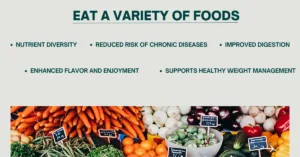
One of the best things you can do for your health is to eat different kinds of foods. This involves incorporating fruits, vegetables, whole grains, lean proteins, and healthy fats into your diet. Each type of food gives your body different nutrients it needs to work well.
Here’s why eating a variety of foods is so important:
- It provides your body with all the essential vitamins and minerals it requires.
- It keeps your meals interesting so you don’t get bored
- It can help prevent food allergies in children
- It supports a healthy gut by feeding different types of good bacteria
Try to make your plate colorful at each meal. Add a green vegetable, some orange carrots, and a piece of fruit. This is an easy way to make sure you’re getting different nutrients.
Drink Plenty of Water

Drinking enough water is super important for your health. Water helps your body in many ways:
- It keeps your body temperature normal
- It helps move nutrients to all parts of your body
- It helps get rid of waste
- It keeps your joints working smoothly
- It protects sensitive tissues in your body
But how much water should you drink? A good rule of thumb is to drink when you feel thirsty and to have water with each meal. The color of your pee can also tell you if you’re drinking enough. If it’s light yellow or clear, you’re probably drinking enough. If your urine is dark yellow, it may indicate that you need to increase your water intake.
Remember, you can also get water from foods like fruits and vegetables. Watermelon, cucumbers, and tomatoes have a high water conftent.
Eat More Fruits and Vegetables
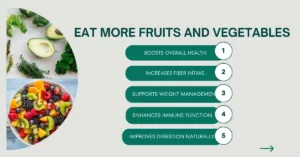
Fruits and vegetables are packed with good stuff your body needs. They have lots of vitamins, minerals, and fiber. Incorporating a greater variety of fruits and vegetables into your diet can provide several benefits.
- Lower your risk of heart disease
- Keep your blood pressure in check
- Lower your chances of developing certain types of cancer.
- Keep your eyes and skin healthy
- Help you maintain a healthy weight
Aim to fill at least half of your plate with fruits and vegetables during every meal. If you’re not used to eating a lot of fruits and veggies, start small. Incorporate a fruit into your breakfast or add a side salad to your lunch. Over time, you can add more.
Don’t forget that all forms of fruits and vegetables count – fresh, frozen, canned, and dried. Just watch out for added sugars in canned fruits and added salt in canned vegetables.
Choose Whole Grains
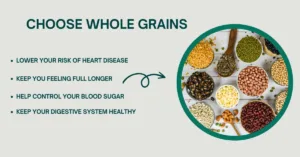
Whole grains are grains that haven’t had their nutritious parts removed. They’re better for you than refined grains (like white bread or white rice) because they have more fiber, vitamins, and minerals.
Eating whole grains can help:
- Lower your risk of heart disease
- Keep you feeling full longer
- Help control your blood sugar
- Keep your digestive system healthy
Some examples of whole grains are:
- Whole wheat bread
- Brown rice
- Oatmeal
- Quinoa
- Whole grain pasta
When you’re shopping, look for the words “whole grain” or “whole wheat” on the package. Try swapping one refined grain food for a whole grain version each week. For example, you could have brown rice instead of white rice with your dinner.
Plan Your Meals
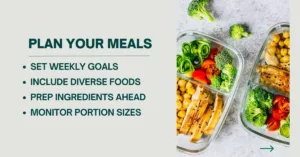
Planning your meals ahead of time can make a big difference in your eating habits. When you plan, you’re more likely to eat healthier foods and less likely to grab unhealthy snacks when you’re hungry.
Here are some tips for meal planning:
- Set aside some time each week to plan your meals
- Make a shopping list based on your meal plan
- Prep some ingredients ahead of time (like washing and cutting vegetables)
- Cook extra food and save leftovers for quick meals later in the week
Meal planning can also help you save money and reduce food waste. When you know what you’re going to eat, you’re less likely to buy extra food that might go bad before you can use it.
Practice Mindful Eating
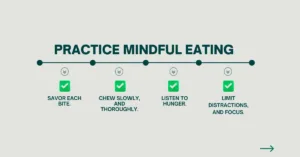
Mindful eating involves being fully aware of your food and the process of consuming it.It’s about enjoying your meals and listening to your body’s hunger and fullness signals.Here are several techniques to engage in mindful eating:Here are some ways to practice mindful eating:
- Eat slowly and chew your food well
- Refrain from watching television and stow away your phone during mealtime.
- Sit down at a table to eat
- Pay attention to the colors, aromas, and tastes of your food.
- Stop eating when you feel satisfied, not overly full
Mindful eating can help you enjoy your food more and may help prevent overeating. It takes about 20 minutes for your brain to get the message that you’re full, so eating slowly gives your brain time to catch up with your stomach.
Limit Processed Foods
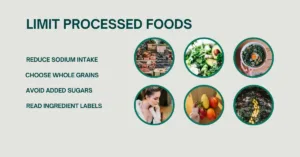
Processed foods are foods that have been changed from their natural state for safety or convenience. Some processed foods are okay to eat, but many have added sugars, unhealthy fats, and too much salt.
Eating too many highly processed foods can lead to health problems like obesity, high blood pressure, and diabetes. Try to limit foods like:
- Sugary drinks
- Packaged snacks (like chips and cookies)
- Fast food
- Frozen meals
- Processed meats (like hot dogs and some deli meats)
Instead, try to eat more whole foods – foods that are close to their natural state. This encompasses a variety of foods such as fruits, vegetables, nuts, seeds, whole grains, and lean proteins.
When purchasing packaged foods, be sure to examine the list of ingredients. Choose items with fewer ingredients and ones you recognize.
Putting It All Together
Remember, healthy eating isn’t about being perfect. It’s about making small, doable changes that you can stick with over time. Here are some final tips to help you put these healthy eating habits into practice:
- Start small. Focus on altering one habit at a time.
- Be patient with yourself. It takes time to form new habits.
- Don’t let a rough day get you down. Simply refocus and aim for better choices with your next meal.
- Make it enjoyable. Try new healthy recipes or cook with friends and family.
- Listen to your body. Eat when you feel hungry and stop when you are content.
By following these 7 healthy eating habits for a balanced life, you can work towards a more balanced and healthier life. Remember, food is meant to nourish and fuel your body, but it’s also meant to be enjoyed. Find a balance that works for you and makes you feel good.
FAQs
1. What are healthy eating habits?
Healthy eating habits include choosing a variety of foods, such as fruits, vegetables, whole grains, lean proteins, and healthy fats. It also involves eating in moderation and staying hydrated to support overall well-being.
2. How can I start eating healthier?
Begin by making small changes, like adding more fruits and vegetables to your meals, choosing whole grains, and reducing sugary snacks. Plan your meals and snacks to avoid unhealthy choices when you’re hungry.
3. Why is breakfast important?
Breakfast jumpstarts your metabolism and fuels your energy for the day ahead. Eating a healthy breakfast can improve concentration and help maintain a balanced diet by reducing cravings later in the day.
4. How can I manage portion sizes?
To manage portion sizes, use smaller plates and bowls, pay attention to serving sizes, and listen to your body’s hunger signals. This can help prevent overeating and promote a healthy weight.
5. Is it okay to have treats?
Yes, it’s perfectly fine to enjoy treats occasionally! Balance is key, so get in moderation while ensuring that most of your meals are healthy. This approach helps maintain a positive relationship with food.
Also Read:
7 Nutrition Tips for Maximizing Workout Results
7-Day Intermittent Fasting Diet Plan India
References:
https://pmc.ncbi.nlm.nih.gov/articles/PMC7071223/
https://pmc.ncbi.nlm.nih.gov/articles/PMC6489487/
https://en.wikipedia.org/wiki/Healthy_diet
Disclaimer: The information provided in this blog on healthy eating habits is for educational purposes only and should not replace professional dietary advice. Please consult a healthcare provider or nutritionist before making significant changes to your eating habits.
Related post

7 Health Benefits of Assam Tea


